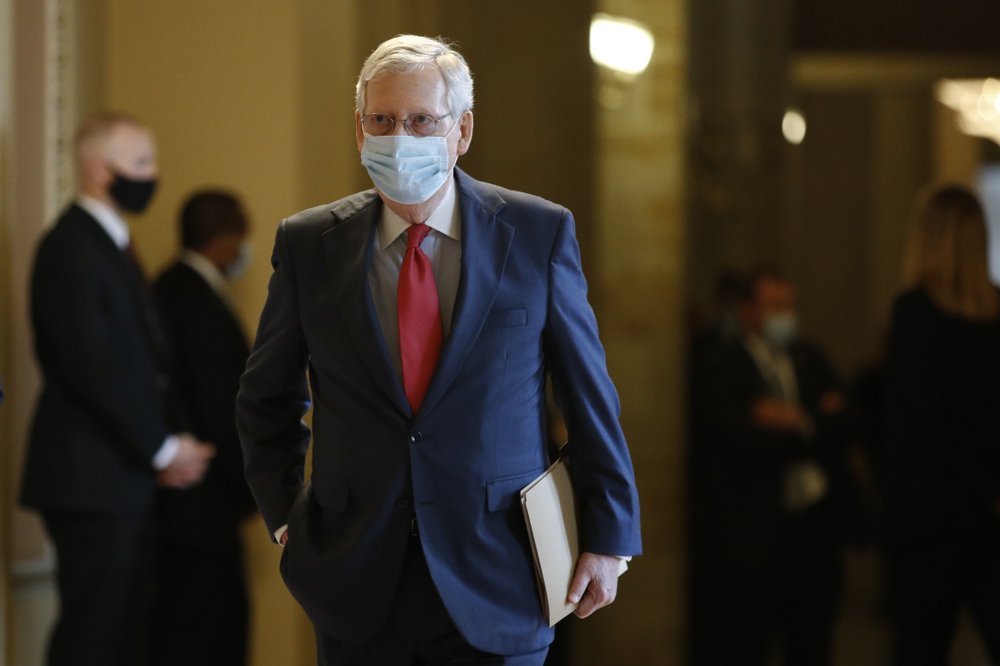National
White House, Senate GOP try again on $1 trillion virus aid

WASHINGTON (AP) — Suggesting a narrower pandemic relief package may be all that’s possible, the White House still pushed ahead with Monday’s planned rollout of the Senate Republicans’ $1 trillion effort as House Speaker Nancy Pelosi assailed the GOP “disarray” as time-wasting during the crisis.
The administration’s chief negotiators — White House chief of staff Mark Meadows and Treasury Secretary Steven Mnuchin — spent the weekend on Capitol Hill to put what Meadows described as “final touches” on the relief bill Senate Majority Leader Mitch McConnell is expected to bring forward Monday afternoon.
“We’re done,” Mnuchin said as he and Meadows left Capitol Hill on Sunday after meeting with GOP staff.
But looming deadlines may force them to consider other options. By Friday, millions of out-of-work Americans will lose an $600 federal unemployment benefit that is expiring and federal eviction protections for many renters are also coming to an end. President Donald Trump’s standing is at one of the lowest points of his term, according to a new AP-NORC poll.
“They’re in disarray and that delay is causing suffering for America’s families,” Pelosi said.
Pelosi panned the Trump administration’s desire to trim the $600 weekly unemployment boost to about 70% of pre-pandemic wages. She also said she opposes tackling a relief package in piecemeal fashion.
With the virus death toll climbing and 4.2 million infections nationwide, the administration officials converged on the Capitol to revive the Republican package that unraveled last week. Republican senators and the White House are at odds over various items, including how to cutback the jobless benefit without fully doing away with it.
Meadows said as the White House was “looking for clarity” on a “handful” of remaining issues with Republicans, but they had yet to talk to McConnell. “We have an agreement in principle,” he said.
Both Mnuchin and Meadows said earlier Sunday that narrower legislation might need to be passed first to ensure that enhanced unemployment benefits don’t run out for millions of Americans. They cited unemployment benefits, money to help schools reopen, tax credits to keep people from losing their jobs, and lawsuit protections for schools and businesses as priorities.
“We can move very quickly with the Democrats on these issues,” Mnuchin said.
But negotiations with Democrats have yet to begin with billions at stake and deadlines near.
Separately, White House economic adviser Larry Kudlow said a federal eviction moratorium on millions of rental units, due to expire at the end of the month, will be extended. “We will lengthen it,” he said, without specifying for how long.
On the jobless benefits, Republicans have argued that federal jobless benefits should be trimmed because the combination of state and federal unemployment assistance left many people better off financially than they were before the pandemic and therefore disinclined to return to their jobs.
Many Democrats contend that a lot of people don’t feel safe going back to work when the coronavirus is surging again around the country.
Meadows, a former congressman who was the head of the conservative House Freedom Caucus, said he is working with Mnuchin and Labor Secretary Eugene Scalia to address complaints that outdated state computer systems will make it difficult for the jobless to get their benefits in a timely fashion if the formula is changed.
“It’s our goal to make sure that it’s not antiquated computers that keep people from getting their benefits,” Meadows said.
Pelosi criticized the hold-up on the GOP side. House Democrats passed a $3 trillion relief package a couple of months ago, with the aim of jump-starting negotiations.
The White House and Senate Republicans were racing to regroup after plans to introduce a $1 trillion virus rescue bill collapsed Thursday during GOP infighting over its size, scope and details.
It was expected to bring $105 billion to help schools reopen, new money for virus testing and benefits for businesses, including a fresh round of loans, tax breaks and a sweeping liability shield from COVID-19-related lawsuits.
The expiration of the $600 weekly jobless benefits boost had been propelling the Republicans to act, bracing to prevent social and economic fallout.
The White House floated plans to cut the additional aid back to $100 a week, while Senate Republicans preferred $200, with general GOP agreement about phasing out the flat boost in favor of one that ensures no more than 70% of an employee’s previous pay.
Apart from jobless benefits, Mnuchin said Saturday that new $1,200 direct payments would be based on the same formula from the earlier aid bill. Then, people making $75,000 or less received the full amount and those making more than $75,000 received less, depending on their income. People earning above $100,000 did not qualify for the payment.
The jobless benefit officially expires July 31, but due to the way states process unemployment payments, the cutoff was effectively Saturday.

